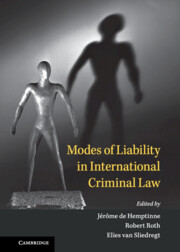Book contents
- Modes of Liability in International Criminal Law
- Modes of Liability in International Criminal Law
- Copyright page
- Contents
- Biographies
- Acknowledgements
- Abbreviations
- 1 Cross-Cutting Issues
- Part I Individual Commission
- Part II Joint Commission
- Part III Participation
- Part IV Participating in Group Activities
- 10 Group Acting with a Common Purpose
- Part V Inchoate and Preparatory Acts
- Part VI Other Forms of Responsibility
- Part VII Concluding Observations
- Index
- References
10 - Group Acting with a Common Purpose
from Part IV - Participating in Group Activities
Published online by Cambridge University Press: 01 July 2019
- Modes of Liability in International Criminal Law
- Modes of Liability in International Criminal Law
- Copyright page
- Contents
- Biographies
- Acknowledgements
- Abbreviations
- 1 Cross-Cutting Issues
- Part I Individual Commission
- Part II Joint Commission
- Part III Participation
- Part IV Participating in Group Activities
- 10 Group Acting with a Common Purpose
- Part V Inchoate and Preparatory Acts
- Part VI Other Forms of Responsibility
- Part VII Concluding Observations
- Index
- References
Summary
Criminal responsibility for contributing to a group acting with a common purpose is a key – yet controversial – issue in ICL. On the one hand, it is well-known that international crimes are normally committed by groups of people acting pursuant to joint plans or agreements. This calls for liability theories that establish responsibility based on the accused’s participation in a collective criminal effort. On the other hand, the principles of individual criminal responsibility and personal guilt proscribe the attribution of crimes committed by others to the accused merely because of his/her membership in a group or organization.
- Type
- Chapter
- Information
- Modes of Liability in International Criminal Law , pp. 309 - 336Publisher: Cambridge University PressPrint publication year: 2019



